一般将来时(小学)
- 格式:ppt
- 大小:785.50 KB
- 文档页数:2

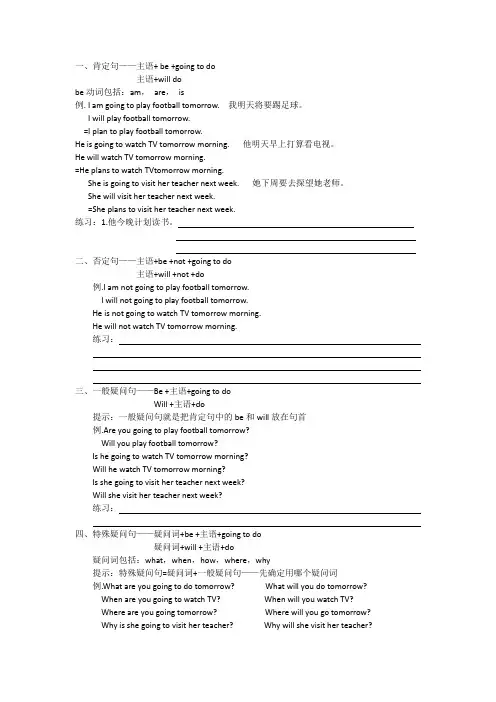
一、肯定句——主语+ be +going to do主语+will dobe动词包括:am,are,is例. I am going to play football tomorrow. 我明天将要踢足球。
I will play football tomorrow.=I plan to play football tomorrow.He is going to watch TV tomorrow morning. 他明天早上打算看电视。
He will watch TV tomorrow morning.=He plans to watch TVtomorrow morning.She is going to visit her teacher next week. 她下周要去探望她老师。
She will visit her teacher next week.=She plans to visit her teacher next week.练习:1.他今晚计划读书。
二、否定句——主语+be +not +going to do主语+will +not +do例.I am not going to play football tomorrow.I will not going to play football tomorrow.He is not going to watch TV tomorrow morning.He will not watch TV tomorrow morning.练习:三、一般疑问句——Be +主语+going to doWill +主语+do提示:一般疑问句就是把肯定句中的be和will放在句首例.Are you going to play football tomorrow?Will you play football tomorrow?Is he going to watch TV tomorrow morning?Will he watch TV tomorrow morning?Is she going to visit her teacher next week?Will she visit her teacher next week?练习:四、特殊疑问句——疑问词+be +主语+going to do疑问词+will +主语+do疑问词包括:what,when,how,where,why提示:特殊疑问句=疑问词+一般疑问句——先确定用哪个疑问词例.What are you going to do tomorrow? What will you do tomorrow?When are you going to watch TV? When will you watch TV?Where are you going tomorrow? Where will you go tomorrow?Why is she going to visit her teacher? Why will she visit her teacher?。
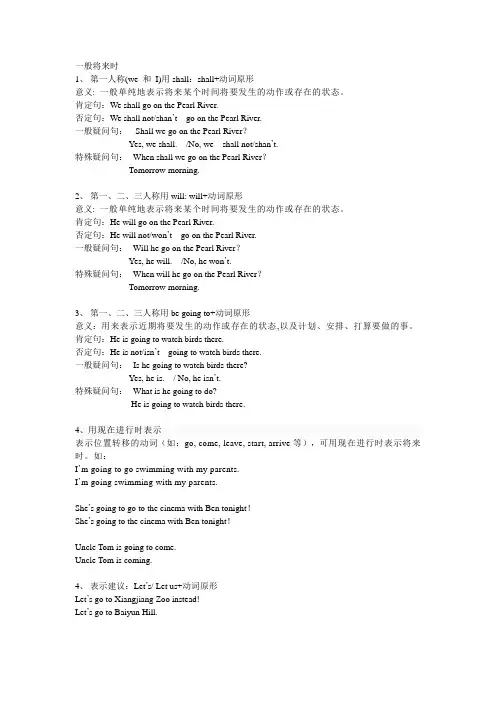
一般将来时1、第一人称(we 和I)用shall:shall+动词原形意义: 一般单纯地表示将来某个时间将要发生的动作或存在的状态。
肯定句:We shall go on the Pearl River.否定句:We shall not/shan’t go on the Pearl River.一般疑问句:-- Shall we go on the Pearl River?--Y es, we shall. /No, we shall not/shan’t.特殊疑问句:--When shall we go on the Pearl River?--Tomorrow morning.2、第一、二、三人称用will: will+动词原形意义: 一般单纯地表示将来某个时间将要发生的动作或存在的状态。
肯定句:He will go on the Pearl River.否定句:He will not/won’t go on the Pearl River.一般疑问句:--Will he go on the Pearl River?--Y es, he will. /No, he won’t.特殊疑问句:--When will he go on the Pearl River?--Tomorrow morning.3、第一、二、三人称用be going to+动词原形意义:用来表示近期将要发生的动作或存在的状态,以及计划、安排、打算要做的事。
肯定句:He is going to watch birds there.否定句:He is not/isn’t going to watch birds there.一般疑问句:--Is he going to watch birds there?--Y es, he is. / No, he isn’t.特殊疑问句:--What is he going to do?-- He is going to watch birds there.4、用现在进行时表示表示位置转移的动词(如:go, come, leave, start, arrive等),可用现在进行时表示将来时。
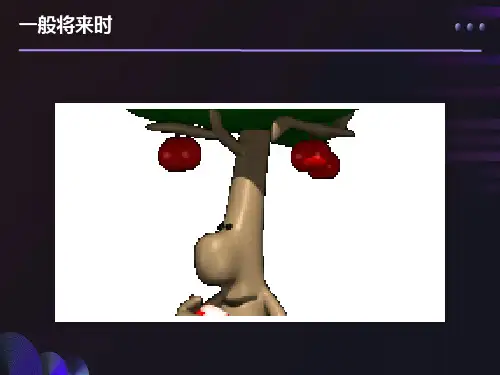
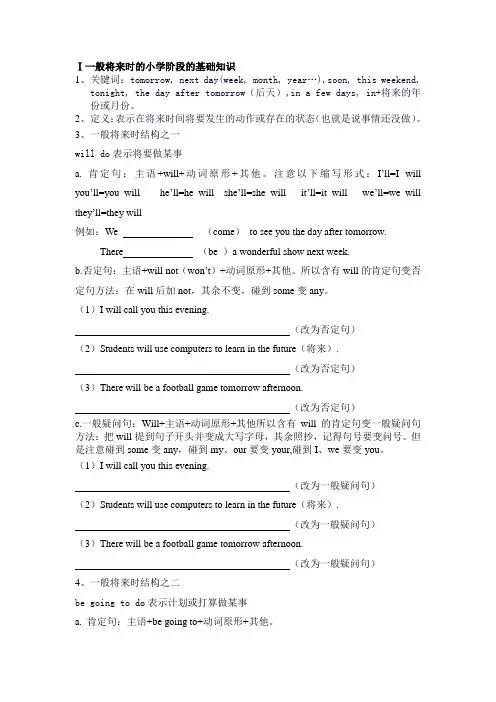
Ⅰ一般将来时的小学阶段的基础知识1、关键词:tomorrow, next day(week, month, year…),soon, this weekend,tonight, the day after tomorrow(后天),in a few days, in+将来的年份或月份。
2、定义:表示在将来时间将要发生的动作或存在的状态(也就是说事情还没做)。
3、一般将来时结构之一will do表示将要做某事a. 肯定句:主语+will+动词原形+其他。
注意以下缩写形式:I’ll=I will you’ll=you will he’ll=he will she’ll=she will it’ll=it will we’ll=we will they’ll=they will例如:We (come)to see you the day after tomorrow.There (be )a wonderful show next week.b.否定句:主语+will not(won’t)+动词原形+其他。
所以含有will的肯定句变否定句方法:在will后加not,其余不变,碰到some变any。
(1)I will call you this evening.(改为否定句)(2)Students will use computers to learn in the future(将来).(改为否定句)(3)There will be a football game tomorrow afternoon.(改为否定句)c.一般疑问句:Will+主语+动词原形+其他所以含有will的肯定句变一般疑问句方法:把will提到句子开头并变成大写字母,其余照抄,记得句号要变问号。
但是注意碰到some变any,碰到my、our要变your,碰到I、we要变you。
(1)I will call you this evening.(改为一般疑问句)(2)Students will use computers to learn in the future(将来).(改为一般疑问句)(3)There will be a football game tomorrow afternoon.(改为一般疑问句)4、一般将来时结构之二be going to do表示计划或打算做某事a. 肯定句:主语+be going to+动词原形+其他。
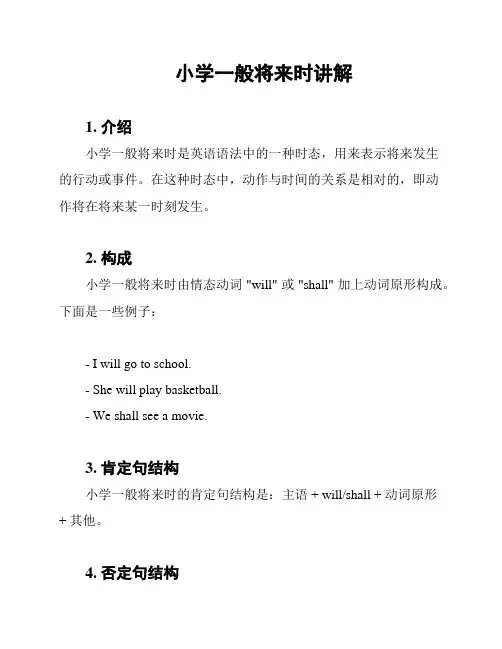
小学一般将来时讲解1. 介绍小学一般将来时是英语语法中的一种时态,用来表示将来发生的行动或事件。
在这种时态中,动作与时间的关系是相对的,即动作将在将来某一时刻发生。
2. 构成小学一般将来时由情态动词 "will" 或 "shall" 加上动词原形构成。
下面是一些例子:- I will go to school.- She will play basketball.- We shall see a movie.3. 肯定句结构小学一般将来时的肯定句结构是:主语 + will/shall + 动词原形+ 其他。
4. 否定句结构小学一般将来时的否定句结构是:主语 + will/shall + not + 动词原形 + 其他。
5. 疑问句结构小学一般将来时的疑问句结构是:Will/Shall + 主语 + 动词原形+ 其他?6. 使用场景小学一般将来时常用于以下场景:- 表示未来的计划或打算:I will go to the park tomorrow.- 表示预测:It will rain later.- 表示意愿或请求:Will you help me with my homework?7. 注意事项在小学一般将来时中,我们要注意以下几点:- 不使用"will"或"shall"来表达对他人的承诺或决定,如"I promise"或"I decide"。
- 在口语中,经常使用"will"而不是"shall"。
- 在第一人称疑问句中,我们可以使用"shall"代替"will",但这并不常见。
希望这份文档对你的小学一般将来时的学习有所帮助!。
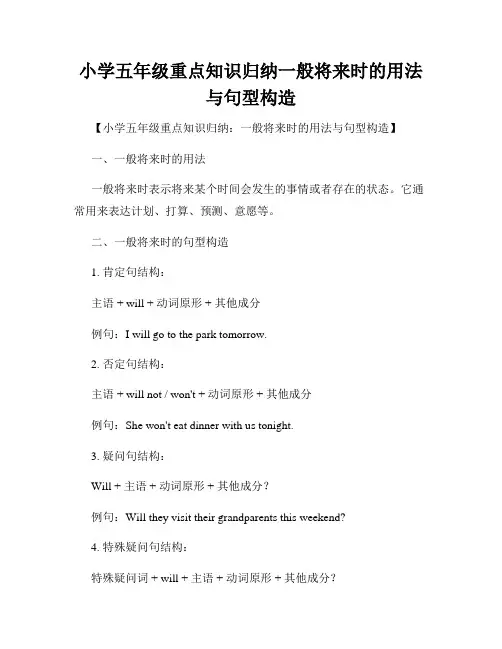
小学五年级重点知识归纳一般将来时的用法与句型构造【小学五年级重点知识归纳:一般将来时的用法与句型构造】一、一般将来时的用法一般将来时表示将来某个时间会发生的事情或者存在的状态。
它通常用来表达计划、打算、预测、意愿等。
二、一般将来时的句型构造1. 肯定句结构:主语 + will + 动词原形 + 其他成分例句:I will go to the park tomorrow.2. 否定句结构:主语 + will not / won't + 动词原形 + 其他成分例句:She won't eat dinner with us tonight.3. 疑问句结构:Will + 主语 + 动词原形 + 其他成分?例句:Will they visit their grandparents this weekend?4. 特殊疑问句结构:特殊疑问词 + will + 主语 + 动词原形 + 其他成分?例句:Where will you go on your vacation?三、一般将来时的常见时间状语1. tomorrow(明天)2. next week(下周)3. in the future(将来)4. soon(很快)5. in a year(一年后)等等四、一般将来时的其他用法1. 表示预测或推测的句子,常使用的词汇有:think,believe,hope,expect等。
例句:I think it will rain later.我认为一会儿会下雨。
2. 表示意愿、请求、建议等情态动词的用法。
例句:I will help you with your homework.我会帮你写作业。
五、一般将来时使用注意事项1. 在一般将来时中,主语为第三人称单数时,动词要加上“s”或者“es”。
例句:He will playsoccer with his friends tomorrow.2. 一些动词在一般将来时的变化形式是不规则的,需要特别注意。
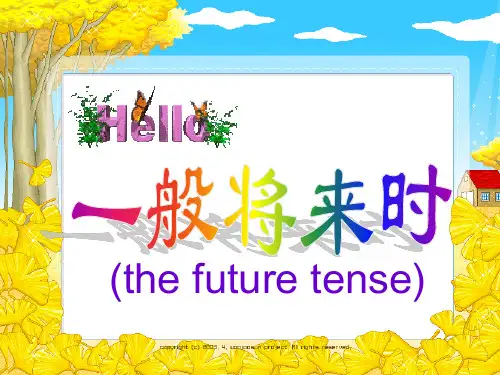
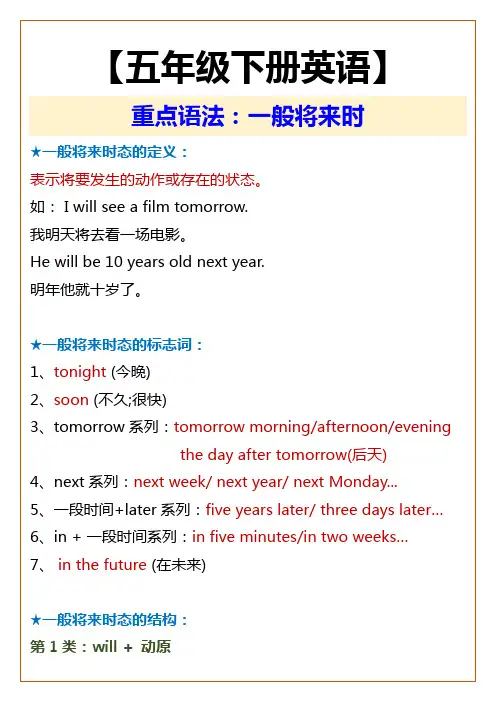
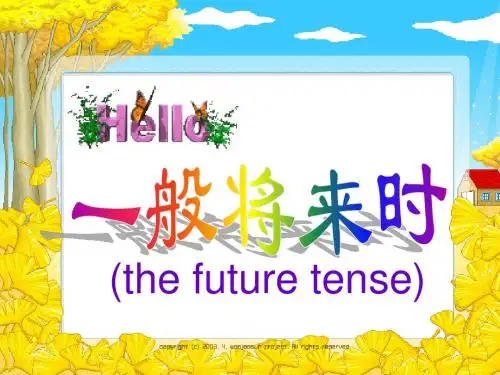
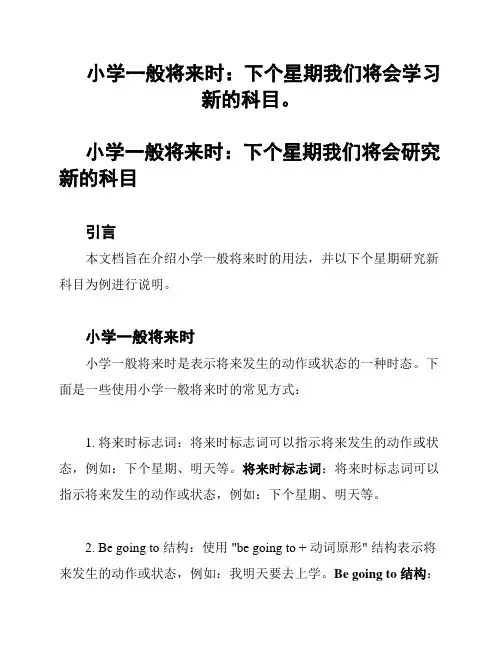
小学一般将来时:下个星期我们将会学习新的科目。
小学一般将来时:下个星期我们将会研究新的科目引言本文档旨在介绍小学一般将来时的用法,并以下个星期研究新科目为例进行说明。
小学一般将来时小学一般将来时是表示将来发生的动作或状态的一种时态。
下面是一些使用小学一般将来时的常见方式:1. 将来时标志词:将来时标志词可以指示将来发生的动作或状态,例如:下个星期、明天等。
将来时标志词:将来时标志词可以指示将来发生的动作或状态,例如:下个星期、明天等。
2. Be going to 结构:使用 "be going to + 动词原形" 结构表示将来发生的动作或状态,例如:我明天要去上学。
Be going to 结构:使用 "be going to + 动词原形" 结构表示将来发生的动作或状态,例如:我明天要去上学。
3. 助动词 will 或 shall:助动词 will 或 shall 可以与动词原形结合使用表示将来发生的动作或状态,例如:我将给你发送一封电子邮件。
助动词 will 或 shall:助动词 will 或 shall 可以与动词原形结合使用表示将来发生的动作或状态,例如:我将给你发送一封电子邮件。
由于文档限定了字数,下面将介绍下个星期我们将会研究新的科目的例子。
下个星期我们将会研究新的科目下个星期,我们将会研究新的科目。
我们会开始研究有关科学的内容。
科学是一门有趣且实用的学科,它帮助我们了解自然界的规律和科学原理。
我们将会进行各种实验和观察,以提高我们的实验能力和观察力。
此外,我们还将研究一些与生活有关的科学知识,例如:水的循环、植物的生长等。
这些知识将帮助我们更好地了解周围的世界,并培养我们的科学思维和解决问题的能力。
我们将会通过听讲座、观看视频、进行小组讨论等方式研究新的科目。
老师将会给我们提供相关的研究材料,并指导我们进行相关实践。
我们还会参观科学展览,以拓宽我们对科学的了解。
小学英语“一般将来时”语法知识一、概念表示将来某个时间要发生的动作或存在的状态,常与一些表示将来的时间状语连用。
例如:I am going to/will watch a football match on TV this evening.今天晚上我将在电视上看一场足球比赛。
二、一般将来时的形式❆will 常简略为'll,并与主语连写在一起,如:I'll,he'll,it'll,we'll,you'll,they'll。
❆一般疑问句如用Will you…?其简略答语须是Yes,I will或No,I will not;如用Shall you…?(较少见)其简略答语须是Yes,I shall.或No,I shall not.。
三、一般将来时的用法❆表示将来的动作或状态一般将来时常与一些表示将来的时间状语连用,如:tomorrow(明天),next week (下周),from now on(从现在开始);in the future(将来)等。
❆表示将来经常发生的动作。
一般将来时表示将来某一时刻的动作或状态,其表达形式除了“shall(第一人称),will(第二、三人称)+动词原形构成”外,还有以下几种形式。
1)“to be going to+动词原形”表示即将发生的或最近打算进行的事。
例如:①It is going to rain. 要下雨了。
②We are going to have a meeting today. 今天我们开会。
2)go,come,start,move,sail,leave,arrive,stay等可用进行时态表示按计划即将发生的动作,例如:I'm leaving for Beijing.我要去北京。
3)“be to+动词原形”表示按计划要发生的事或征求对方意见。
例如:①Are we to go on with this work?我们继续干吗?②The boy is to go to school tomorrow.这个男孩明天要去上学。
小学英语语法之一般将来时小学英语语法之一般将来时在英语语法中,一般将来时是一种常用的时态,它表示将来要发生的事情。
对于小学生来说,理解并掌握一般将来时的规则和用法是非常重要的。
本文将通过定义、基本语法、句型变化、实例分析和注意事项五个方面,详细介绍小学英语语法之一般将来时。
一、定义一般将来时表示将来要发生的事情,通常与时间状语“will”和“shall”相关联。
例如:1、I will go to the park tomorrow.2、Shall we have a party next weekend?二、基本语法一般将来时的基本语法结构包括否定词、肯定词和连接词。
1、否定词:在一般将来时中,否定词通常使用“not”,例如“I will not go to the party.”表示“我不会去参加聚会”。
2、肯定词:肯定词使用频率最高的就是“will”,表示未来的意愿。
例如“She will bring her book tomorrow.”表示“她明天会带她的书”。
3、连接词:连接词在一般将来时中通常是“and”或“or”,例如“Hewill play football and I will watch TV.”表示“他将踢足球,我将会看电视”。
三、句型变化一般将来时有多种句型变化,以下是常见的几种:1、将来式:主语 + will + 动词原形例如:You will have a new friend next week.2、过去式:主语 + would + 动词原形例如:Last week, he would not eat vegetables.3、现在式:主语 + be going to + 动词原形例如:We are going to watch a movie tonight.四、实例分析让我们通过一些具体的例子来分析一般将来时的用法:例1:My parents will visit us next month. 下个月,我的父母将会来看我们。
小学英语一般将来时一、什么是一般将来时一般将来时是用来表示将来某个时间会发生的动作、事件或状态的时态。
它常常用于描述计划、打算、预测或意图。
二、一般将来时的构成一般将来时的构成是通过使用助动词"will"(在第三人称单数形式为"will")和动词的原形来表示将来的动作或状态。
以下是一些构成一般将来时的例子:1. 肯定句:主语 + will + 动词原形 + 其他例如:I will go to the park tomorrow.(我明天会去公园。
)2. 否定句:主语 + will not / won't + 动词原形 + 其他例如:She won't eat candy tonight.(她今晚不会吃糖果。
)3. 疑问句:Will + 主语 + 动词原形 + 其他?例如:Will they come to the party?(他们会来参加派对吗?)三、一般将来时的使用场景下面是一些小学英语中常见的使用一般将来时的场景:1. 表示计划或打算:I will visit my grandparents next month.(我下个月会去拜访我的祖父母。
)2. 表示预测或推测:It will rain tomorrow.(明天会下雨。
)3. 表示意愿或承诺:I will help you with your homework.(我会帮你做作业。
)4. 表示未来常态:The school will start at 8:00 AM tomorrow.(明天学校将会在早上8点开始。
)5. 表示请求、命令或建议:Will you please pass me the book?(你能给我递一下那本书吗?)四、注意事项1. "will"后面的动词使用原形形式。
2. 助动词"will"可以缩写成"’ll"。
一般将来时小学语法题及答案一、单项选择题1.—What _ _ you do this weekend? —I _ _ shopping with my mom.A. are; will goB. do; goC. will; goD. are; going答案:C. will; go2.—_ _ you come to my birthday party tomorrow? —Yes, I _ _.A. Do; willB. Will; doC. Will; willD. Do; do答案:B. Will; do3.Look! The clouds are dark. It _ _ soon.A. will be rainyB. is rainingC. rainsD. rain答案:A. will be rainy4.My parents _ _ a new car next month.A. will buyB. buysC. buyD. is buying答案:A. will buy5.—_ _ you watch TV tonight? —No, I _ _ my homework.A. Are; will doB. Will; will doC. Do; will doD. Will; do答案:D. Will; do二、完形填空阅读短文,根据短文内容选择正确的选项。
It’s Saturday tomorrow. Eric 1 very excited. He 2 to the park with his friends. They 3 a lot of fun there.In the morning, Eric 4 to the store 5 buy some snacks for the picnic. Then he 6 to the park with his friends. They 7 to the slides, swings and seesaws. They 8 kick a soccer ball 9the field. It’s a sunny day and they all 10 very happy.1. A. am B. is C. are D. be答案:C. are2. A. goes B. go C. went D. going答案:B. go3. A. has B. had C. have D. having答案:C. have4. A. want B. wants C. wanted D. wanting答案:B. wants5. A. but B. and C. or D. so答案:B. and6. A. go B. goes C. going D. to go答案:A. go7. A. play B. plays C. played D. playing答案:A. play8. A. can B. could C. did D. do答案:D. do9. A. on B. at C. to D. in答案:C. to10. A. is B. am C. are D. be答案:C. are三、阅读理解阅读短文,根据短文内容选择正确的选项。
一般将来时一、一般将来时:表示将来某个时间要发生的动作、事情,或存在的状态。
二、.结构:▲(1)主语+will/shall+动词原形+(其他)shall用于主语是第一人称单数,will在陈述句中用于各人称.I shall do my homework tomorrow morning.I/He/She/They will do my/his/her/their homework tomorrow morning. He will get up soon.I will=I Shall=I’ll★在表示客观事实的时候只能用此结构。
(1).It will rain tomorrow.明天将要下雨.(2).It will be Teachers'Day the day after tomorrow.后天将是教师节.(3).My birthday will come.我生日将要到了.▲(2)主语+am/is/are going to+动词原形+(其他)a.主语的意图,即将做某事。
I am going to Shanghai tomorrow.b.计划,安排要发生的事。
The play is going to be produced next month。
c.有迹象要发生的事。
Look at the dark clouds,there is going to be a storm.(3)主语+be+to+动词原形+(其他),表示按计划要发生的事或征求对方意见。
We are to discuss the report next Saturday.(4)主语+am/is/are about to+动词原形,意为马上做某事。
He is about to leave for Beijing.(5)主语+be+v-ing,表示将来,表示按计划即将发生的动作,这类动词有go,come,start,move,sail,leave,arrive,stay,live,fly。